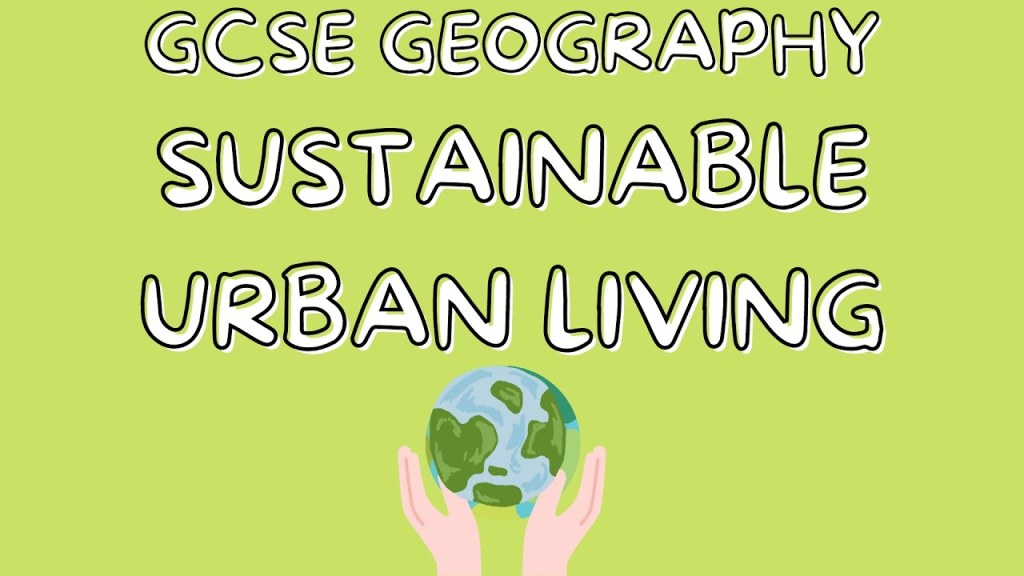Master Sustainable Living With GCSE Geography: Unlock The Secrets To A Greener Future!
Sustainable Living GCSE Geography: The Key to a Greener Future
Greetings, friends! In this article, we will explore the concept of sustainable living in the context of GCSE Geography. Sustainable living is an essential topic that focuses on reducing our carbon footprint and preserving our planet’s resources. By adopting sustainable practices, we can ensure a healthier environment for ourselves and future generations. Let’s delve into the details of sustainable living in GCSE Geography and discover how we can make a positive impact.
Introduction
3 Picture Gallery: Master Sustainable Living With GCSE Geography: Unlock The Secrets To A Greener Future!



Sustainable living in GCSE Geography encompasses various aspects, including energy conservation, waste management, and sustainable transportation. It aims to find the balance between meeting our present needs while ensuring the availability of resources for the future. This concept encourages individuals and communities to make environmentally conscious choices in their everyday lives.
In this article, we will cover the what, who, when, where, why, and how of sustainable living in GCSE Geography, examining its advantages and disadvantages, and addressing some frequently asked questions. By the end, we hope to inspire you to take action and contribute to a more sustainable future.
What is Sustainable Living GCSE Geography?

Image Source: ytimg.com
Sustainable living in GCSE Geography refers to the practice of adopting environmentally friendly behaviors and making conscious choices to reduce our impact on the planet. It involves minimizing waste production, conserving energy, and promoting sustainable development.
By integrating sustainable living principles into our daily lives, we can preserve natural resources, reduce pollution, and mitigate the effects of climate change. It also helps us to understand the interconnectedness of human activities and their impact on ecosystems.

Image Source: ytimg.com
The study of sustainable living in GCSE Geography equips students with the knowledge and skills necessary to make informed decisions and contribute to a sustainable future.
The Importance of Sustainable Living
Sustainable living is crucial for several reasons. Firstly, it helps to address the global environmental crisis by reducing greenhouse gas emissions, conserving biodiversity, and minimizing resource depletion. Secondly, it promotes social equity by ensuring access to resources and opportunities for all. Lastly, it provides economic benefits by fostering innovation, creating green jobs, and reducing long-term costs associated with environmental degradation.
Who Can Practice Sustainable Living in GCSE Geography?
Sustainable living is not limited to a specific group of individuals. It is a concept that can be embraced by people of all ages and backgrounds. Whether you are a student studying GCSE Geography, a teacher, a parent, or a community member, you can contribute to sustainable living by making conscious choices and spreading awareness.

Image Source: ytimg.com
By integrating sustainable practices into educational institutions and engaging in collaborative efforts, we can create a collective impact that extends beyond our immediate surroundings.
When and Where Can Sustainable Living in GCSE Geography be Applied?
The principles of sustainable living can be applied at any time and in any location. Whether you are at home, in school, or traveling, you can make sustainable choices that contribute to a greener future. These choices include conserving energy, reducing waste, utilizing public transportation, and supporting local and sustainable businesses.
Specifically in the context of GCSE Geography, sustainable living can be incorporated into coursework, projects, and fieldwork. It allows students to analyze real-world issues, propose sustainable solutions, and become active participants in creating a more sustainable society.
Why is Sustainable Living in GCSE Geography Important?
The study of sustainable living in GCSE Geography is important because it equips students with the knowledge, skills, and values needed to address environmental challenges. It promotes critical thinking, problem-solving, and ethical decision-making. By understanding the interconnectedness of social, economic, and environmental factors, students can make informed choices that contribute to a sustainable future.
How Can Sustainable Living in GCSE Geography be Practiced?
Sustainable living in GCSE Geography can be practiced in various ways. Here are some examples:
1. Reduce energy consumption by turning off lights and appliances when not in use, utilizing energy-efficient technology, and using natural lighting whenever possible.
2. Minimize waste generation by recycling, composting organic materials, and opting for reusable products rather than single-use ones.
3. Embrace sustainable transportation options such as walking, cycling, carpooling, or using public transportation.
4. Conserve water by taking shorter showers, fixing leaks, and utilizing water-efficient appliances.
5. Support sustainable agriculture by purchasing locally sourced, organic, and seasonal food products.
6. Educate others about sustainable living practices and advocate for policies that promote sustainability.
Advantages and Disadvantages of Sustainable Living in GCSE Geography
Sustainable living in GCSE Geography offers numerous advantages and disadvantages:
Advantages:
1. Environmental Preservation: By adopting sustainable practices, we can reduce pollution, conserve natural resources, and protect ecosystems.
2. Health Benefits: Sustainable living promotes cleaner air, water, and food, resulting in improved health and well-being for individuals and communities.
3. Economic Savings: Energy conservation, waste reduction, and sustainable practices can lead to long-term cost savings and the creation of green jobs.
Disadvantages:
1. Initial Costs: Implementing sustainable practices may require upfront investments, which could be a barrier for some individuals or communities.
2. Limited Accessibility: Sustainable options may not be readily available or affordable for everyone, creating disparities in access to sustainable living.
3. Behavior Change: Adopting sustainable habits requires a shift in mindset and behavior, which can be challenging for some individuals.
Frequently Asked Questions (FAQ)
1. Can sustainable living really make a difference?
Absolutely! Every small action counts when it comes to sustainable living. Collectively, our choices have the power to create significant positive change and contribute to a more sustainable future.
2. Is sustainable living only about the environment?
No, sustainable living encompasses social, economic, and environmental aspects. It aims to strike a balance between these three pillars to ensure a holistic approach to sustainability.
3. How can I convince others to embrace sustainable living?
Lead by example and share your knowledge and experiences. Educate others about the benefits of sustainable living and encourage them to make small changes in their daily lives.
4. Are there government initiatives to support sustainable living in GCSE Geography?
Many governments have implemented policies and programs to promote sustainable living. These initiatives include renewable energy incentives, waste management strategies, and sustainable transportation plans.
5. Can sustainable living save money?
Yes, sustainable living can lead to cost savings in the long run. By conserving energy, reducing waste, and making sustainable choices, individuals can lower their utility bills and reduce expenses associated with resource consumption.
Conclusion
In conclusion, sustainable living in GCSE Geography plays a vital role in shaping a greener and more sustainable future. By embracing sustainable practices, we can minimize our impact on the environment, conserve resources, and promote social equity. It is up to each one of us to take action and make a difference. Let’s work together to create a world where future generations can thrive.
Remember, the choices we make today will determine the world we leave behind for tomorrow. Start practicing sustainable living in GCSE Geography and inspire others to do the same. Together, we can build a brighter and greener future.
Final Remarks
In this article, we have explored sustainable living in the context of GCSE Geography. Sustainable living is a crucial concept that empowers individuals to make environmentally conscious choices and take responsibility for the future of our planet. By adopting sustainable practices, we can mitigate the effects of climate change, reduce pollution, and preserve natural resources.
It is important to remember that sustainable living is a journey, and every small step counts. Start by implementing simple changes in your daily life, such as reducing waste, conserving energy, and supporting local and sustainable businesses. Together, we can create a more sustainable and resilient world for ourselves and future generations.
This post topic: Idensr Lifestyles

